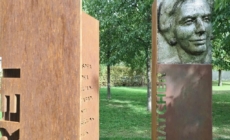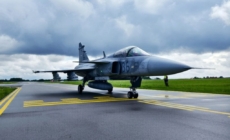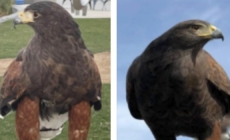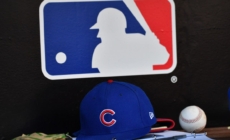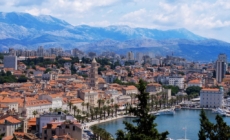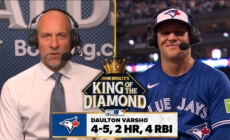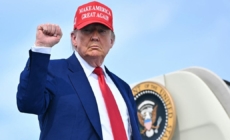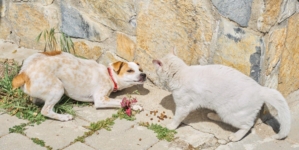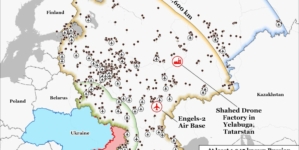-
Budapest Statue of Margaret Thatcher Honors the ‘Iron Lady’s’ Legacy - 12 mins ago
-
Woman's brutal killing hidden by trailer park fire - 27 mins ago
-
Josh Allen’s Message to Stefon Diggs After Patriots Upset Bills Revealed - 32 mins ago
-
Ozzy Osbourne considered suicide after botched neck surgery complications - 34 mins ago
-
Our Gripens Halfway Through Their Baltic Mission with over 50 Takeoffs - 45 mins ago
-
NFL, CFB Weekend Betting Recap: Huge Underdogs Help Books Win Big - 49 mins ago
-
One of two hawks stolen from SoFi Stadium during Rams game is found - about 1 hour ago
-
Cubs Lose 4-Year Veteran To Free Agency After Letdown Season - about 1 hour ago
-
New Border Connection: M6 Motorway Links Directly to Croatia’s A5 - about 1 hour ago
-
Daulton Varsho on 2-HR game vs. Yankees, Blue Jays growing momentum & more 🏆 King of the Diamond - 2 hours ago
Multiple Russian incursions expose contrast between U.S. and allies’ responses
A series of unprecedented Russian incursions into NATO members’ airspace in recent weeks has raised the alarm across Europe, which is looking towards an emboldened Kremlin for clues to its intentions and next moves.
The incidents have also exposed a contrast between European leaders’ urgent calls for action and President Donald Trump’s more muted response, as he continues to hold back on imposing additional sanctions on Moscow as its war on Ukraine rages on.
On Friday, for the second time in 10 days, a NATO ally invoked Article 4 following airspace violations linked to Russia — a mechanism that prompts urgent talks among allies and that had only been triggered seven times in its 76-year history before this month.
Earlier in the day, three MiG-31 fighter aircraft entered Estonian airspace without permission and remained there for a total of 12 minutes, according to the country’s Ministry of Defense. NATO aircraft intercepted the jets, the military alliance’s spokesperson Allison Hart said.
Estonia’s Foreign Minister Margus Tsahkna called the incursion “unprecedentedly brazen,” saying Russia had already violated its airspace four times this year.
It was “an extremely dangerous provocation,” added Kaja Kallas, the European Union’s foreign policy chief.
Russia denied violating Estonian airspace, saying aircraft were making a scheduled flight from from Russia to Kaliningrad, an exclave wedged between Poland and Lithuania, that was conducted in “strict compliance” with international regulations.
While European leaders have responded with urgency, signaling deep concern and pushing for stronger measures on Moscow amid Russia’s ongoing invasion of Ukraine, President Donald Trump has struck a more restrained note as he continues to hold back on imposing further sanctions on the Kremlin.
“I don’t love it,” Trump said Friday on the latest incursion. “I don’t like when that happens. Could be big trouble.”
Although Trump has expressed frustration and disappointment with Putin, saying on Thursday that the Russian leader “has let me down,” relations with the Kremlin have warmed dramatically during this administration.
Trump has also been unwilling to impose further sanctions on Russia over the invasion of Ukraine, despite repeated threats.
The President said last week he was “ready to do major sanctions on Russia,” once NATO nations had “agreed, and started, to do the same thing,” and criticized allies for continuing to purchase Russian oil.
Estonia and the United States are members of NATO, which at its core is a mutual defense pact formed after World War II to counter the threat posed by the Soviet Union, meaning an attack on one may be considered an attack on all.
Friday’s incident marked the third incursion into NATO airspace linked to Russia in ten days.
On Sept. 10, Poland reported Russian drones entering its territory, triggering the first Article 4 request this month. Four days later, Romania scrambled jets to respond to a Russian drone breach. Romania did not invoke Article 4.
Moscow downplayed the incident, saying it had “no plans to target” facilities in Poland, but Polish Prime Minister Donald Tusk said it was “the closest we have been to open conflict since World War II.”
Trump, again, offered a more muted response, saying the suspected incursion “could have been a mistake.”
His acting U.S. ambassador to the United Nations, Dorothy Shea, sought to reassure allies. Violating the airspace of a U.S. ally, “intentionally or otherwise,” showed “immense disrespect for good-faith U.S. efforts to bring an end to this conflict,” she told the U.N. Security Council.
“Rest assured, we will defend every inch of NATO territory,” she added.
Moscow has not commented on the Romanian claims.
Brett Erickson, a sanctions expert and adviser to Loyola University’s Chicago School of Law, warned that Russian President Vladimir Putin was testing the West’s resolve, and battlefield readiness.
“If the West hesitates, Russia will keep testing, probing, and collecting data on our response,” he told NBC News via email. “Every incursion is a rehearsal. Unless we act decisively now, we are training Moscow to believe NATO is predictable, divided, and slow.”
The divergence between Europe’s urgent stance and Trump’s restraint comes as Ukrainian President Volodymyr Zelenskyy pressed Washington for stronger measures, who has urged Trump to take a clearer position on Moscow.
“If the war continues and there are no movements towards peace, we expect sanctions,” he told reporters Friday evening, adding that he expects Trump to take such actions.
Russian air strikes killed at least three people and wounded dozens more as it launched a large-scale missile and drone attack across multiple Ukrainian regions on Friday night.
Loyala’s Erickson said sanctions were essential, and must be “all-out” and “all-together,” urging Washington to align with its allies.
“President Trump must put his foot down,” he said. “Enough is enough.”
Source link
